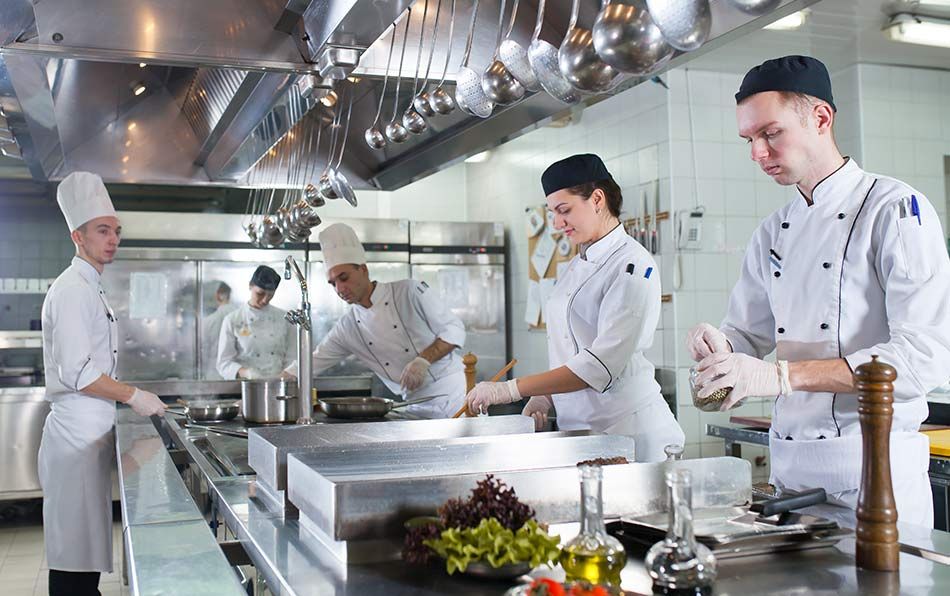In this article, we'll show you how to hire a Chef for your restaurant by highlighting how to write the job description, conduct the interview process and ultimately make a compelling job offer.
Understanding Different Chef Roles
Before initiating the hiring process, it's crucial to understand the various Chef positions and their responsibilities within a kitchen hierarchy. This knowledge ensures you recruit the right candidate for your establishment's specific needs.
- Executive Chef (Chef de Cuisine): Oversees the entire kitchen operation, including menu creation, staff management, and budgeting. Typically found in larger establishments.
- Head Chef: Manages daily kitchen activities, supervises staff, and ensures the quality of dishes. Often works closely with the restaurant manager.
- Sous Chef: Acts as the second-in-command, assisting the Head Chef and stepping in during their absence. Responsible for inventory and ensuring kitchen stations are prepared.
- Pastry Chef: Specializes in creating desserts, breads, and other baked goods. Ideal for establishments with a strong focus on their dessert menu.
- Sushi Chef: Prepares and arranges sushi by selecting and preparing fresh ingredients, expertly slicing fish and combining them with rice, seaweed and other accompaniments to create visually appealing and flavorful dishes.
Understanding these roles will help you craft precise job descriptions and attract suitable candidates.
Essential Skills and Qualifications to Look for When Hiring a Chef
When hiring a Chef, it's crucial to assess both their culinary expertise and their ability to manage kitchen operations effectively. Key skills and qualifications include:
- Culinary Experience: A strong background in various cooking techniques and cuisines.
- Leadership Abilities: Experience in leading and mentoring kitchen staff to maintain high performance and morale.
- Creativity: Ability to develop innovative dishes that align with your restaurant's concept.
- Attention to Detail: Precision in preparation and presentation to ensure consistent quality.
- Stress Management: Capability to perform under pressure during peak service times.
- Formal Training: Culinary degrees or certifications can be advantageous but are not always mandatory.
What a Chef Job Description Should Look Like
A good Chef job description will attract the right candidates and weed out applicants you don't want. Your job listing should state clearly what you're looking for and what a candidate can expect if they apply.
Be specific about the duties that come with the Chef job and the minimum level of relevant industry experience required. Another thing you can do to attract more candidates is to list all the perks of working in your restaurant and talk more about your company's culture. Additionally, outline the working conditions, including expected working hours, physical demands and the kitchen environment. Clearly state the compensation package, benefits and opportunities for professional development.
Providing this information helps manage candidate expectations and attracts individuals who align with your restaurant's operational standards. When crafting your job description, keep in mind that there are different types of Chefs in the kitchen hierarchy and that their roles differ slightly in terms of key responsibilities.
For example, if you already have a Head Chef or Station Chef, and you want to bring in someone who'll be in charge of desserts and sweet goods, make sure to post a Pastry Chef job description that is specific for the role.
Where To Find Qualified Chefs
To find qualified Chefs, turn to relevant job portals or a recruiting agency that can get you in touch with candidates in your area. Since the role typically doesn't require formal education, you can look at all the candidates' resumes and see which ones meet your expectations. Look for candidates with previous experience in relevant positions and skills that matter the most for the role.
However, it's a good sign if a candidate has a Chef certification as it shows they've received training in food safety and sanitation and have potentially learned more about working in the role.
Another thing you can do is think about an opportunity to hire internally. Instead of bringing a new Chef, you can promote a Cook from your team and give them a chance to prove themselves in a new position. By helping your current employees to grow professionally, you'll create a better work atmosphere and motivate them to prove themselves.

In addition to traditional methods, consider leveraging social media platforms like LinkedIn and Facebook to showcase your restaurant's culture and attract potential candidates. Attending culinary job fairs and networking events can also connect you with talented chefs actively seeking new opportunities. Partnering with local culinary schools for internships or apprenticeship programs can help you discover emerging talent eager to grow within your establishment.
The Interview Process
After penning your job description, you'll hopefully have many candidates apply for the job.
The interview process is where you'll get to meet them and learn who they are as a person. It'll also help you better understand their backgrounds and whether they're a good fit for your restaurant.
Prepare for this step by going through common interview questions for Chefs and customize them so they suit your position and establishment. You can focus on both technical culinary skills and team management questions.
Conducting Practical Assessments
The interview process is pivotal in determining a candidate's suitability. Consider the following steps:
- Technical Assessment: Request candidates to prepare a signature dish to evaluate their skills and creativity.
- Behavioral Questions: Ask about past experiences to gauge problem-solving abilities and adaptability.
- Cultural Fit: Discuss your restaurant's values to ensure alignment with the candidate's philosophy.
- Reference Checks: Contact previous employers to verify work history and performance.
Beyond traditional interviews, conducting practical assessments is essential to evaluate a candidate's culinary skills and compatibility with your kitchen environment.
- Cooking Trial: Have candidates prepare a dish from your menu or create a new dish to assess their cooking techniques, creativity and presentation skills.
- Kitchen Simulation: Observe how candidates perform under typical kitchen pressures, including time management, multitasking and collaboration with existing staff.
Evaluating Candidates
When evaluating candidates, look for key skills that'll help them succeed in the role. We listed the most important ones below.
Cooking experience
Becoming a Chef typically requires some experience working in a kitchen environment. Most Chefs started their careers as Cooks and eventually transitioned into their current roles.
Chefs and Cooks aren't the same, but you can consider giving an experienced Cook an opportunity to take on a Chef role. If you already have an Executive Chef, they can serve as their mentor and help them adjust to the new role.
Leadership skills
All Chef roles involve some form of team management. While strong leadership may be less relevant for a Pastry Chef, it's an absolute must when hiring an Executive Chef.
Their job sees them manage the entire kitchen team, handle finances and come up with solutions to company-wide issues and problems. So, if you're creating a job description for an Executive Chef, don't forget to highlight leadership experience as one of the key requirements.
Eye for detail
The Chef role requires having a lot of attention to detail, especially when it comes to plating dishes and creating a menu for your restaurant.
While all Chefs have to possess meticulous attention to detail, this is something to focus on even more when hiring a Pastry Chef as well-plated desserts will determine how successful your restaurant is.

Creating Competitive Compensation and Benefits
To attract and retain top chef talent, it’s crucial to offer a compelling compensation package. Beyond salary, Chefs look for benefits that reflect work-life balance and career growth.
- Salary benchmarking: Research industry salary standards for Chefs in your area. Offering competitive pay ensures you stay attractive to experienced candidates.
- Bonuses and incentives: Implement performance-based bonuses or profit-sharing to reward Chefs for meeting financial targets or achieving excellent reviews.
- Work-life balance: Provide reasonable working hours and offer paid time off. Consider flexible schedules to prevent burnout.
- Professional development: Cover costs for advanced culinary training, certifications or participation in culinary workshops and events.
- Health and wellness: Include health insurance, gym memberships and mental health support programs.
Highlighting these benefits in the job description can differentiate your restaurant from competitors.
Making the Job Offer
Once you've identified your ideal candidate, it's time to make a formal job offer that outlines the terms and conditions of the role. This is a crucial step in securing the candidate and ensuring both parties are on the same page regarding expectations.
Start by clearly communicating the contract details, such as the length of the contract (whether it's permanent, temporary or seasonal) and any probationary periods. This will help the candidate understand the commitment required and any performance evaluations that may take place during the initial months.
Once the candidate accepts the offer, promptly inform other Chef candidates that the position has been filled. This not only closes the loop with the remaining applicants but also maintains a professional and respectful relationship for any future opportunities. Sending a thank-you note to those who weren't selected helps keep a positive rapport, should you need to reach out to them for future roles.
Onboarding Your New Chef
The first onboarding step is to collect all the necessary paperwork from your new employee. This includes things like their Social Security Number (SSN), W-4 form, I-9 form and their emergency contacts.
After that, you should introduce them to the rest of the team, familiarize them with their workplace and give them their first tasks.
Being a new worker in the kitchen isn't easy. You can help out your new Chef by providing them with constructive feedback after the first few weeks and asking them to voice any issues or inquiries they might have.
Retaining Your Chef
Hiring a good Chef is one thing, but keeping them in your establishment is arguably harder.
Remember to give them recognition for a job well done and hand out performance bonuses when they've earned them. This will go a long way towards making them stay in your restaurant and reducing the turnover rate.
Creating a safe and enjoyable work atmosphere in the kitchen can help as well. Invest in new cooking equipment like professional Chef knives and listen to any recommendations made by the Chef on what can be improved.
Final Thoughts
The right Chef can help build a name for your restaurant and lead the kitchen towards your shared goals. It's probably one of the hardest hires you'll have to make as an owner or a Restaurant Manager, but when you get it right, there's no doubt it'll be rewarding.




.png)

.png)
.png)